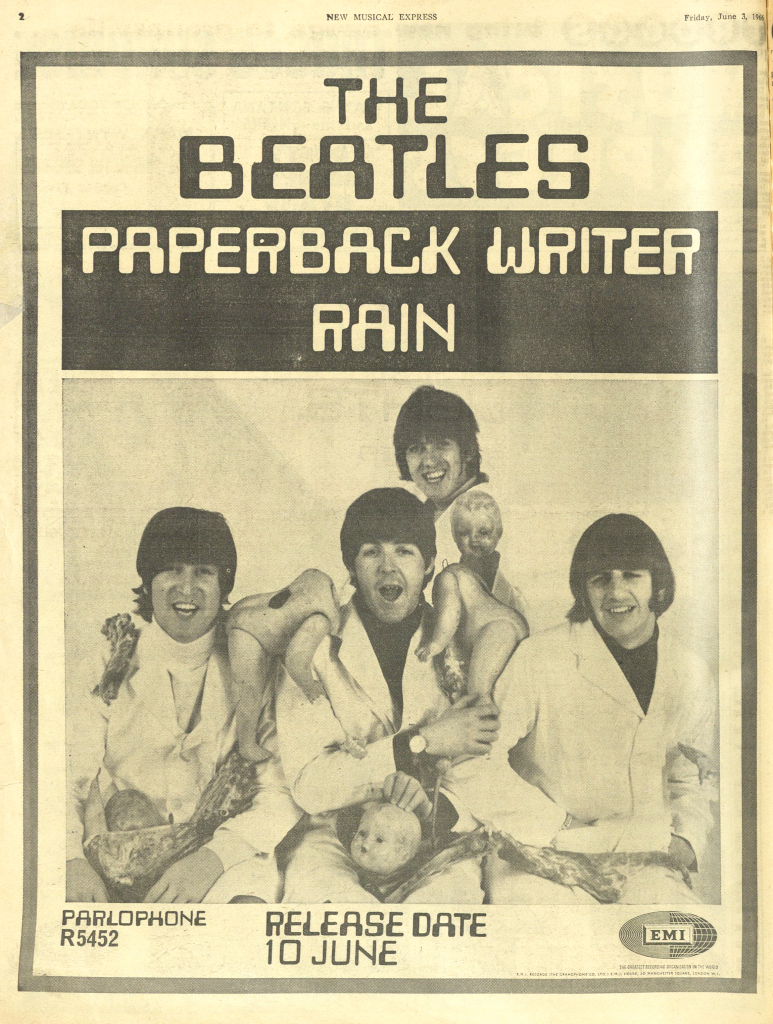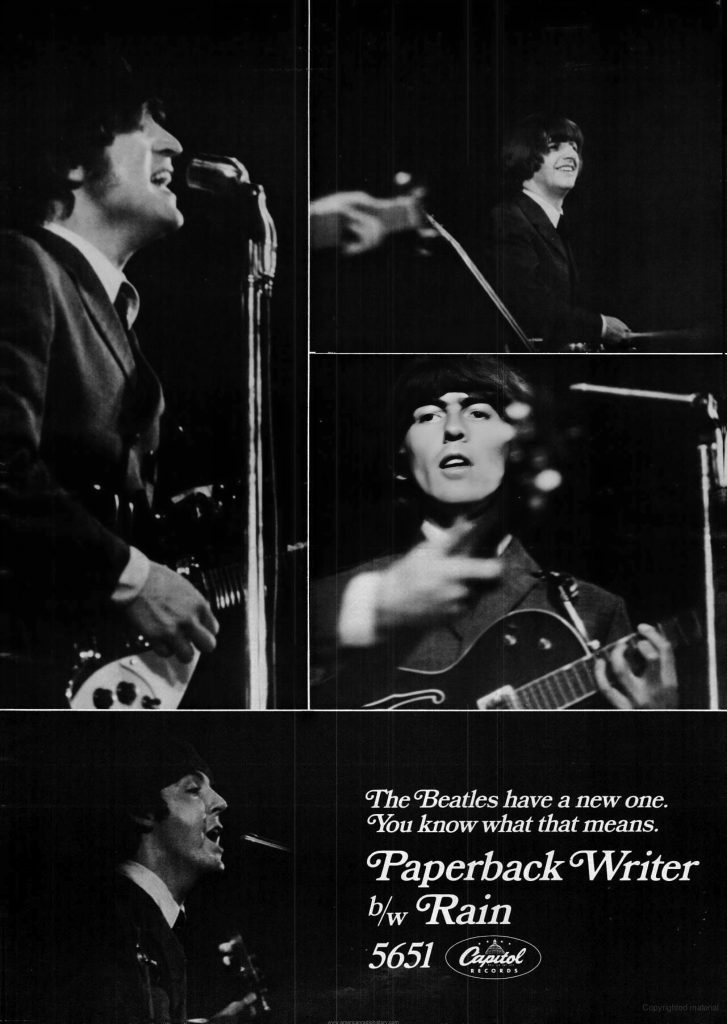“Paperback Writer / Rain” was the twelfth UK single from The Beatles.
From Wikipedia:
“Paperback Writer” was issued as a single in the US by Capitol Records on 30 May 1966, with the catalogue number 5651 and “Rain” as the B-side. The UK release, on EMI’s Parlophone label, took place on 10 June, with the catalogue number R 5452. It was the Beatles’ first UK single since the “Day Tripper” / “We Can Work It Out” double A-side in December 1965. Other than their brief performance at the annual NME Pollwinners Concert on 1 May, promotion for the new record was also the first sign of public activity by the band since the start of the year.
Reviewing the single for the NME, Derek Johnson said that “Paperback Writer” “swings along at a thundering pace”, with McCartney’s lead vocal “aided by some startling chanting”. He admired Starr’s “cymbal bashing” and concluded, “those sudden breaks in tempo help to increase the impact.” In Disc and Music Echo, Penny Valentine said the song had a “marvellous dance beat” and was “very striking” due to its “break-up drumming and ethereal surf chorus”. Record World‘s reviewer wrote that with a new Beatles single, “the rush is on”, and commented on the band’s use of “interesting electronic effects to good effect”, while Cash Box predicted that the group would easily continue their run of “blockbuster” singles and described the A-side as “a rhythmic, pulsating ode with an infectious repeating riff all about the creative urge”.
The more widely held view was one of disappointment, according to author Peter Doggett, and dismissal as “a brash, insubstantial throwaway”. Writing in The Beatles: An Illustrated Record, NME critics Roy Carr and Tony Tyler described “Paperback Writer” as “the first Beatles single to receive less-than-universal acclaim”, saying that it was “perhaps a trifle too ‘clever'” and criticism was focused on “the triviality of the lyric and a slight nagging suspicion that the Beatles were playing at ‘being songwriters’ at a time when the world was waiting for The Word”. The band’s apparent aloofness also alienated many of their fans, who wrote into Record Mirror to disparage the group’s new music. The UK music press were similarly offended by the ads for the single, which included a second “butcher” photo appearing in full colour on the cover of Disc and Music Echo, accompanied by the caption “Beatles: What a Carve-Up!” In author Nicholas Schaffner’s description, this image led “one crusty columnist to rail against the importation of American ‘sick humor’ into the United Kingdom”.
Such was the Beatles’ status, they were scrutinised in the press when, like “Day Tripper” / “We Can Work It Out”, the single failed to top all of the UK’s sales charts straightaway. On the Record Retailer chart (subsequently adopted as the UK Singles Chart), “Paperback Writer” entered at number 2, behind Frank Sinatra’s “Strangers in the Night”, before taking the top position the following week. On the national chart compiled by Melody Maker, the song debuted at number 1, remaining there for a total of four weeks. Amid a climate of failing domestic economy, despite the country’s strong exports through music, the record’s UK sales were the lowest for any Beatles single since “Love Me Do” in 1962.
In the US, “Paperback Writer” topped the Billboard Hot 100 for two non-consecutive weeks. It replaced the Rolling Stones’ “Paint It Black” and was then deposed by Sinatra’s single for a week before returning to number 1. It was certified as a gold record by the Recording Industry Association of America on 14 July. The single also topped the charts in Australia, West Germany and many other countries around the world.
The song’s release coincided with London being feted by the US media as the “Swinging City” of international culture. In his book on the 1960s, social historian Arthur Marwick says the Beatles represented the popular image of a phenomenon in which “hitherto invisible swathes of British society became visible and assertive” and “Paperback Writer” was the song that best conveyed “the new class-defying tide of individualistic enterprise”.
“Paperback Writer” was the only new song the Beatles included in their 1966 tour setlist. Their inability to reproduce the layered vocal effect of the studio recording was a source of embarrassment for the group, however. […]


By The Beatles • 7" Single
By The Beatles • 7" Single
Paperback Writer / Rain (UK - 1976)
By The Beatles • 7" Single
Paperback Writer / Rain (UK - 1986)
By The Beatles • 7" Single
By The Beatles • 7" Single
By The Beatles • 7" Single
Officially appears on Paperback Writer / Rain (UK)
Officially appears on Paperback Writer / Rain (UK)
Jun 16, 1966 • UK • London • BBC Television Centre • TV show
Recording "Love You To", "Paperback Writer"
Apr 13, 1966 • Songs recorded during this session appear on Revolver (UK Mono)
Recording "Paperback Writer", "Rain"
Apr 14, 1966 • Songs recorded during this session appear on Paperback Writer / Rain (UK)
Apr 16, 1966 • Songs recorded during this session appear on Paperback Writer / Rain (UK)
My Broken Tooth - by Paul McCartney
Jun 24, 1966 • From New Musical Express